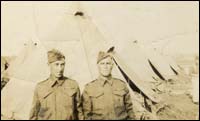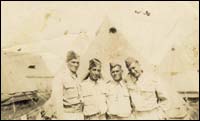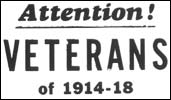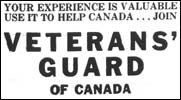The Veterans Home Guard (later renamed Veterans Guard) was authorized by Canada on 24 May 1940. By June 1940, a Veterans Home Guard of 3000 men had been established. A number of men from the local area enlisted. In November 1940, several of them who were stationed in Charlottetown slipped home to visit families in Summerside.
It was announced in November that two platoons would be stationed in Summerside. Local entrepreneur B.I. Rayner leased his building, known locally as the Agricultural Hall, for use as a barracks. The renovations by local contractor Ray Tanton were inspected by Commanding Officer Major Duvar in January 1941, just before the troops moved in.
 Eighty men under Lieut W. J. Silliker took turns at guard duty at the RCAF Station while it was under construction. They also turned out to Sunday church parades and participated in local community activities, including War Savings campaigns. The men were guests of the Legion for supper and cards and attended the first wings ceremony at the No. 9 Service Flying Training School. The detachment was inspected twice by prominent individuals - once by Colonel Alley, the officer administering the Veterans Guard of Canada, and another time by Defence Minister Ralston.
Eighty men under Lieut W. J. Silliker took turns at guard duty at the RCAF Station while it was under construction. They also turned out to Sunday church parades and participated in local community activities, including War Savings campaigns. The men were guests of the Legion for supper and cards and attended the first wings ceremony at the No. 9 Service Flying Training School. The detachment was inspected twice by prominent individuals - once by Colonel Alley, the officer administering the Veterans Guard of Canada, and another time by Defence Minister Ralston.This Island detachment was transferred to another province in May 1941. A group from New Brunswick replaced it until August, when its presence was determined to be no longer necessary.
In August of 1942, recruiters for the Veterans Guard were in Summerside to find men willing to serve as guards for prisoners of war or in the performance of other special duties. The government later ran ads encouraging veterans to enlist for home duty in the regular army. It was suggested they could serve as clerks, accountants, cooks, etc. so that younger men could take a more active role.
| Related Articles | Related Images | Related Memories | Related Websites | Inflation Calculator |
| Home Page | Site Map | Contact Us | Wyatt Heritage Properties |






